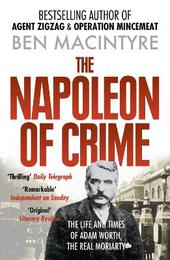
|
The Napoleon of Crime: The Life and Times of Adam Worth, the Real Moriarty
Paperback / softback
Main Details
| Title |
The Napoleon of Crime: The Life and Times of Adam Worth, the Real Moriarty
|
| Authors and Contributors |
By (author) Ben Macintyre
|
| Physical Properties |
| Format:Paperback / softback | | Pages:320 | | Dimensions(mm): Height 198,Width 129 |
|
| Category/Genre | True Crime |
|---|
| ISBN/Barcode |
9780006550624
|
| Classifications | Dewey:364.162092 |
|---|
| Audience | |
|---|
|
Publishing Details |
| Publisher |
HarperCollins Publishers
|
| Imprint |
HarperPress
|
| Publication Date |
15 June 1998 |
| Publication Country |
United Kingdom
|
Description
In the 1870s, Adam Worth left a life of professional deserting from the US army and entered into a life of full-scale crime. He soon became an orchestrator of thefts and cons throughout 19th-century America and Britain, and ringleader of the largest crime network in the world. He was famed, among other triumphs, for stealing Gainsborough's great portrait of the Duchess of Devonshire - and later for returning it. Yet, for many years, he was considered by many to be the perfect Victorian gentleman and, even in his criminal capacity, abhorred violence and was loyal to a fault. Conan Doyle based the character of Holmes' great adversary Moriarty on Adam Worth, who had his own Holmes in the shape of William Pinkerton of Pinkerton's detective agency, from whose slogan "the eye that never sleeps" originated the term "private eye". Their parallel careers form the basis of this book.
Author Biography
Ben Macintyre is the author of Forgotten Fatherland, The Napoleon of Crime, A Foreign Field and Agent Zigzag. He is the former parliamentary sketch-writer for The Times and has been the paper's correspondent in New York, Paris and Washington. He now lives in London.
Reviews'A good deal more thrilling than most thrillers' Ruth Rendell, Daily Telegraph 'A most remarkable and entertaining biography. It is a highly charged thriller, a moving love affair, a dramatic history of the Victorian criminal underworld, a noble tragedy.' Alexander Waugh, Independent on Sunday
|